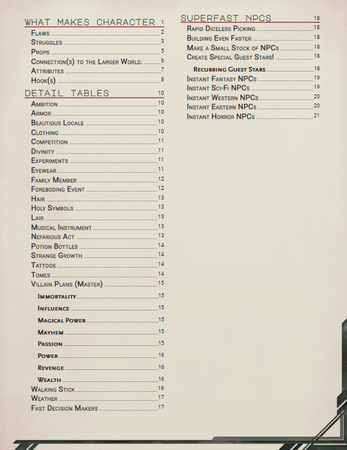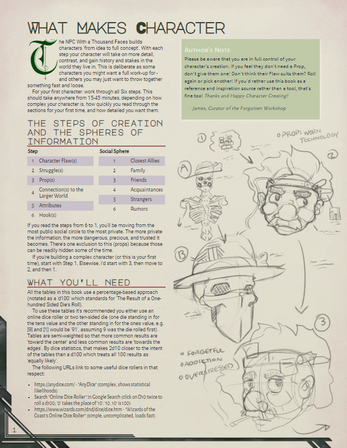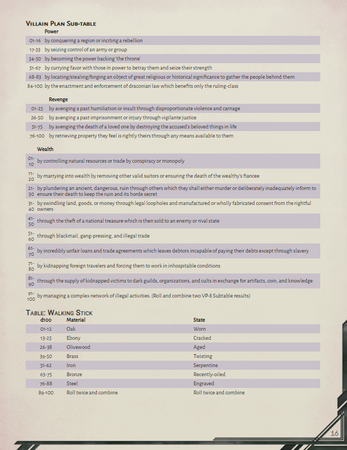The NPC with a Thousand Faces
A downloadable Pen-and-Paper RPG Book for Windows
Used by over 9000 DMs, Writers, and Roleplayers!
Customer Testimonials
"This is SO useful! I think I'm going to roll up several NPCs to have on hand, as the book suggests. I especially like the Villain Plan tables! (5/5)"
"I found the tables and explanations to be comprehensive and helpful. It's easy to make up an NPC, but creating a rounded character players will interact with over time can be difficult. This gave some great tools to make that easier. (5/5)"
Companion App is in development! Check out the latest devlog for more info and a sneak peek!
It's happened to all of us: the players decide to speak to an NPC you didn't prepare for. The most you have is a name and maybe even a race -- but you're drawing blanks! Who is this barkeep? What do they really want in life? What are their struggles?
The NPC With a Thousand Faces is a technique I've built to generate NPCs from my over 17 years of running Tabletop Games with a menagerie of systems. It's Fast! It's Flexible! It's Focused! It's Table-Tested!
Rescue yourself from those awkward moments that threaten to pull players out of the experience -- or hand the book over to them to assist them rolling up a fascinating new character that goes beyond a sheet with a class and lists of equipment and powers.
Included in this 24 Page Supplement:
- The 1000 Faces Technique
- 48 fast, d100-based, tables that make rolling up a complex character a snap
- Blistering fast, diceless (because sometimes you don't want players to know you haven't rolled this NPC up), tables inspired by Bantam Books' Choose your own Adventure Series' Diceless Random Rolls to help you instantly add depth.
- 100 pre-rolled NPCs Traits customized for a variety of genres! (Fantasy, Sci-fi, Western, Eastern, and Horror)
Want to further support my works? Check out Gravekeeper Academy and its Patreon!
| Status | Released |
| Category | Book |
| Publisher | |
| Rating | Rated 4.9 out of 5 stars (21 total ratings) |
| Author | Firgof |
| Genre | Role Playing |
| Made with | Unity |
| Tags | Character Customization, dungeon-master, pathfinder |
| Average session | A few minutes |
| Languages | English |
| Inputs | Keyboard, Mouse, Touchscreen, Smartphone |
Purchase
In order to download this Pen-and-Paper RPG Book you must purchase it at or above the minimum price of $2.50 USD. You will get access to the following files:
Development log
- Early Version now Available for Download!Sep 12, 2021
- 5k Downloads! Companion App in development!Sep 11, 2021
- New price!Jan 26, 2021





Comments
Log in with itch.io to leave a comment.
My comment is on the Companion app specifically.
Program looks interesting and useful potentially, but with no settings it is very frustrating and excruciatingly tedious to use. It forces a screen resolution which on a large high-res screen is very inconvenient. The program is also not intuitive and hard to understand. The music is also not optional, but constantly playing, without a sound slider.
A windowed mode with resolution options, sound options, and some instructions on how to use it would make it into quite a useful helper.
loving this! quick question, how do you generate the social sphere?
Could you create a Linux build of the companion app, please?
Fantastic resource for both contemplative preparation and heat of the moment emergencies. 10/10
Great resource, awesome tables!
but I think you got the part about 2d10 being different from 1d100 wrong...
Dice probability statistics are pretty funny like that, actually. If a D50 existed, those would work OK too instead of 2d10s!
Check out the following rolls on anydice.com! The graph output shows the likelihood of 'any roll of the given values will land on that result'.
This is what the probability of getting any result on a d100 looks like...
...and this is what 2d10 looks like!
If we had the theoretical 'd50s', this is what they'd look like if you rolled them.
Dice probability statistics is how I know that the 'average roll on a d6' is 3.5 and that you should take a 3d4 (mean result 7.5) weapon over a 1d12 (mean result 6.5) ! Pays to know these things to help give players a subtle and useful edge over NPCs.
But the 2d10 table you linked can only result in numbers 2 through 20.
I think this link represents what we do with 2 d10s to represent 1-100:
https://anydice.com/program/1c384
Ah, I see the issue. I suppose I wasn't clear enough in the language. The 2d10 method works best on actually rolled ("offline") dice, because you're using each die as a substitute for the 'tens' and the 'one'.
For instance, I roll a 4 and a 7 on my 2d10. That means I rolled '47'. 8 and 4 -> 84. 3 and 5 -> 35. '00' is 100, '01' is... 01.
I came up with the 2d10 method because most people just don't own a 100-sided die. They're basically a golf-ball anyway and just roll and bounce forever on smooth surfaces. There are 'd100' dice though, where you get a 'tens' d10 (10, 20, 30 [...]) and a 'ones' d10 (1, 2, 3 [...]) but I tried to not rely on folks having a full set of dice. The 'd100' dice is actually the same roll we're simulating with two d10s anyway, by virtue of the fact we're still rolling two dice.
Yet, digitally, if you ask some dice rollers for a 'd100' it will roll a literal 'd100' rather than the '2d10 with one tens die and one ones die', which 'unskews' the table. You can just tell whatever dice roller 'gimme 2d50' if it allows for custom dice though and it will output the correct sorts of results.
There is no actual difference between rolling a 'd100' or rolling '2d10 with one tens die and one ones die', this goes for any dice, digital or real.
There IS a difference between rolling 1d12 vs 2d6, vs 3d4. This is because there are multiple ways to roll some results when using more that one die. Craps is a dice game built around '7' being the most common roll on 2d6.
Once you use a d10 for the tens place and a d10 for the ones place, this property no longer applies; there is only one combination of dice rolls that result in each number 1-100.
2d50 WOULD give the kind of center-skewed result you are describing, but of course then you couldn't roll a '1'!
>There is no actual difference between rolling a 'd100' or rolling '2d10 with one tens die and one ones die', this goes for any dice, digital or real.
I suppose I was taught incorrectly then. My understanding is that according to dice probability statistics all dice 'bend to their combined median' in results when multiple same-sided dice are introduced and that the probability curve becomes more a sin-wave the more dice are introduced but is only ever 'flat' when rolling a singular die. The median for a d100 is 50, where the medians for two d10s would be '5 and 5', which would leave me expecting 50s (and more specifically 55s) more often and for the 2d10s to skew very slightly towards the higher end of the table of possible results vs the much more neutrally weighted d100.
Any case, as goes 2d50: that's accounted for in my tables as in every table you don't get a different result when you roll a 1 versus a 2; I tried to keep it method agnostic so that it didn't matter what method was used.
I would caveat that with digital dice rollers, some use neutrally-weighted tables that treat every possible result of the given set of dice as equally likely, which would 'unbias' the dice. (Also some don't use particularly high quality RNGs -- but that's a separate matter entirely haha)
Sorry to reopen an old thread, but it looks like 2d50 is *exactly* what you're going for, with more likely results in the middle (near 50). I programmed a d50 in Sophie's Dice (also available through Itch) and rolled up some NPCs for tomorrow's game; this is a fantastic resource!
That's awesome! It's great to hear all this stuff is helping folks out. Oh, also, if you didn't see it there's a companion app available so that you don't have to break out the dice (digital or otherwise) and can get results straight from the table. I just launched it yesterday and, though it's still an early version, it's got everything but the villain plans and pre-rolled NPCs in it. No definitions or long-form explanations in it yet that the book provides but it should help if you're doing prep-work and want stuff done in a hurry.
Best of luck with your game!